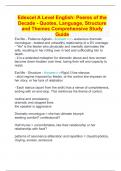Edexcel A Level English: Poems of the
Decade - Quotes, Language, Structure
and Themes Comprehensive Study
Guide
Eat Me - Patience Agbabi - Answer>>- audacious dramatic
monologue - twisted and unhealthy relationship of a DV marriage.
- "He" is the feeder who physically and mentally dominates the
wife, resulting in her rolling over in bed and suffocating him to
death.
- It is a extended metaphor for domestic abuse and how women
become down-trodden over time, losing their will and capacity to
resist.
Eat Me - Structure - Answer>>Rigid 3 line stanzas
- strict regime imposed by feeder, or the control she imposes on
her story, or her lack of retaliation
- Each stanza (apart from the sixth) has a sense of completeness,
ending with an end-stop. This reinforces the theme of control.
routine and consistency
dramatic end stopped lines
the speaker is aggressive
Dramatic monologue = she has ultimate triumph
seeking comfort? confessional?
Half rhyme = uncomfortable, like their relationship or her
relationship with food?
patterns of assonance alliteration and repetition = claustrophobia,
cloying, excess, sensuous
,Eat Me - Language - Answer>>Key themes- food, cannibalism,
temptation, relationships
- blindly follows instruction, disempowered submissive,
enjambment - automatically follows, no control
caesura and short sentences = tension, contemplation
retrospective?
Alliteration - 'broad belly wobble', 'judder like a juggernaut' =
emphasise the movement, the words 'flow' like her fat
He is taking pleasure in watching her - desire
sexual imagery = 'girls i can burrow inside', she is a receptacle,
she is like landterm-28
colonialism
Possessive pronouns = his jacuzzi, his pleasure = objectifies and
subjugates her
compared to a luxury item
'swell' vs 'rush of fast food' - her pleasure is short term
water imagery = beached whale, tidal wave of flesh
my globe of a cheek
drowned in my flesh/his dying sentence
power shift , she is dominant, 'roll over on top', he enabled her to
kill him by feeding her,
ambiguous ending
end stopped lines = closure, control, she is free
,Eat Me - Didn't even taste it. - Answer>>- It is at this point that
the reader realises that she no longer finds enjoyment in food - it
appears only as a chore for her.
Eat Me - forbidden fruit. - Answer>>- There is still no mention of
the danger she is in, although it is implied in the reference to
'forbidden fruit', as if in their sub-conscious minds there is an
awareness that the situation is wrong; a reference to Original Sin
and the temptation of the Garden of Eden in Genesis 2:16.
Eat Me - too fat - Answer>>- The repetition of "too fat" shows
her awareness of her situation.
- seems powerless, her fatness is beyond being 'an emotional
shield'
- tone = disturbingly unemotional and resigned.
- long submitted to his control, the will to resist has clearly left her
entirely.
- Notably, it ends on a caesura, creating a pause before the
change of tone in stanza eight.
Eat Me - He said, Open wide, poured olive oil down my throat. -
Answer>>- This is clearly a man who gives orders and is
accustomed to being obeyed.
- The obsession with fattening her is blatant; without subtlety.
- He doesn't even pretend to give her a pleasant tasting cake.
Instead this pouring of oil is a metaphor for extreme physical
abuse.
- Note also the interesting suggestion by one reader that the
assonant 'o's could imitate the sound of choking.
Eat Me - There was nothing else left in the house to eat. -
Answer>>- The final line is open to interpretation. That there
was 'nothing left to eat' implies that she can start a new life
without endless, dangerous food.
, - But she has been spiritually damaged, so it could also imply that
he has robbed her of the only thing she has known for the
duration of their relationship.
- She is therefore left with spiritual emptiness.
- abused women often still love their abusers after they have
parted or the man has died. She has become so spiritually
diminished by him that there is a question over whether she can
rebuild her life.
History- John Burnside - Answer>>Key themes- death, tragedy
(set straight after 9/11), childhood, nature
This poem links an outing to the beach with his son with the 9/11
tragedy, with each action symbolising an element of the disaster
("finding evidence of life in all this driftwork"), and realises that
only man could've made these horrible things happen the poem
ends with the poet wanting to hold on to the purity and innocence
of childhood. The staggered structure also plays a key role in that
it creates a physical representation of the destruction.
History - Lucas gathering shells and pebbles finding evidence of
life in all this - Answer>>- This momentous event is contrasted
with the sweetness of playing with a child on a beach, collecting
shells and evidence of sea-life.
- These are contrasting opposites; innocence and the natural
world on the one hand and violence on the other.
- There is a further significance to this section, in that it mirrors the
terrible task of the rescue services to find dead and live bodies in
the rubble of the twin towers.
- We might wonder if the child's name, Lucas, is ironically similar
in sound to the Air Force Base, Leuchars, which was on high alert
for possible attack, and where the 'war on terror' might be
initiated.




